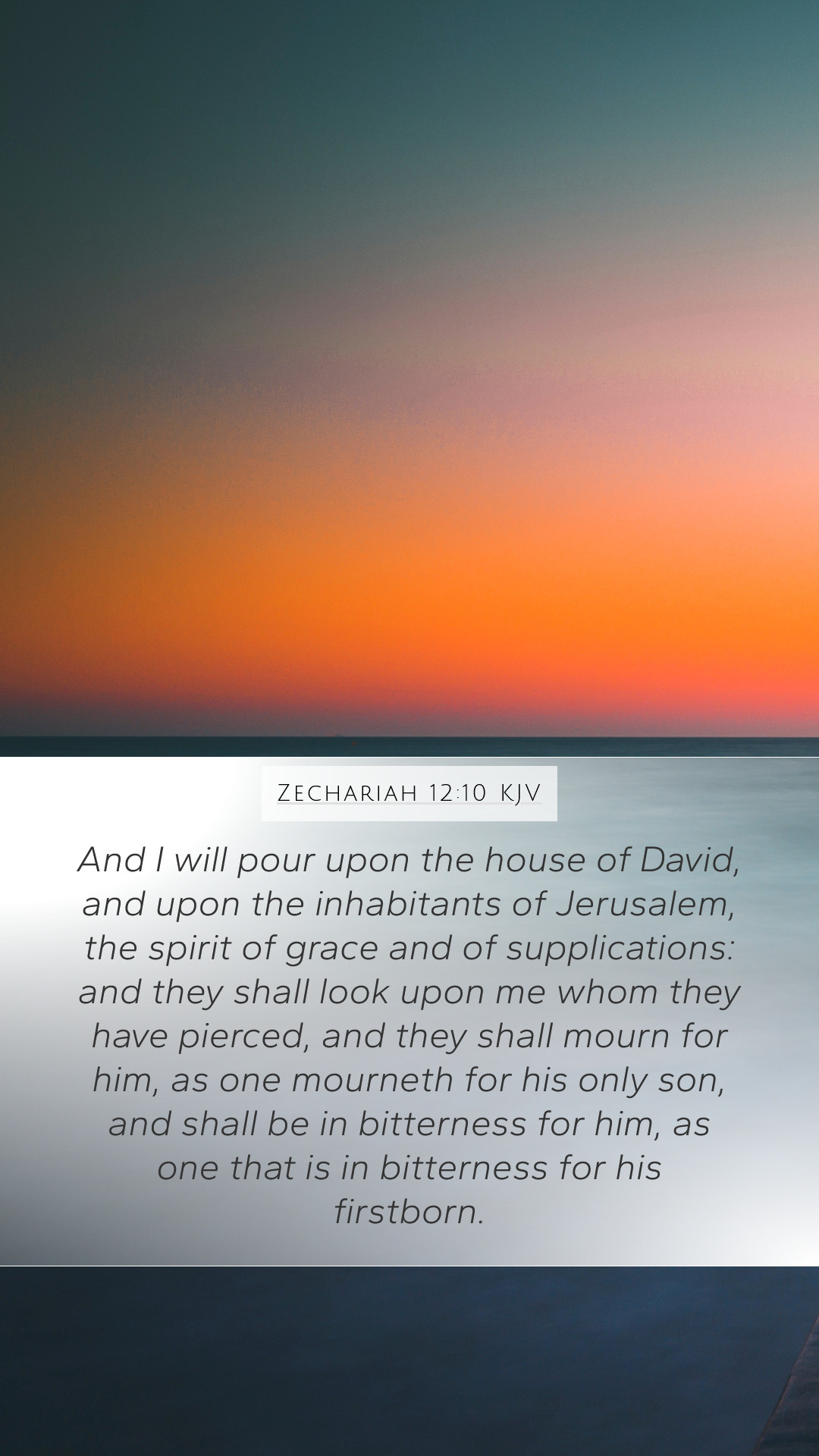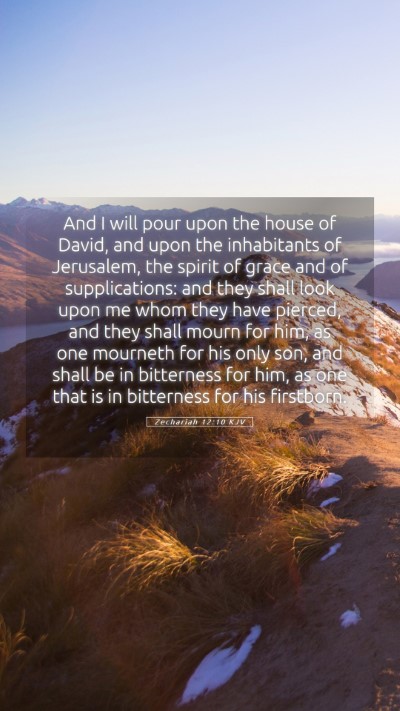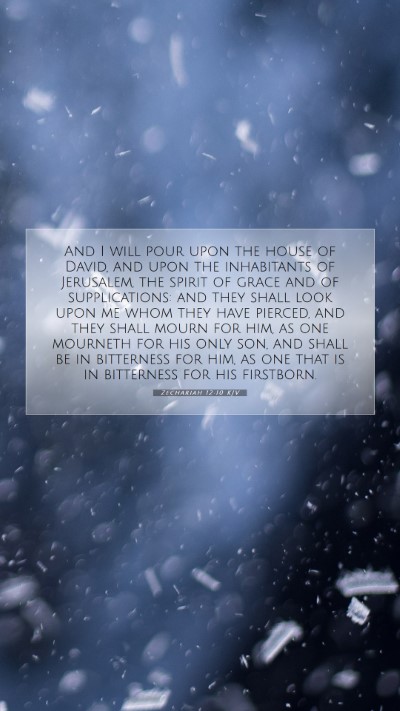Old Testament
Genesis Exodus Leviticus Numbers Deuteronomy Joshua Judges Ruth 1 Samuel 2 Samuel 1 Kings 2 Kings 1 Chronicles 2 Chronicles Ezra Nehemiah Esther Job Psalms Proverbs Ecclesiastes Song of Solomon Isaiah Jeremiah Lamentations Ezekiel Daniel Hosea Joel Amos Obadiah Jonah Micah Nahum Habakkuk Zephaniah Haggai Zechariah MalachiZechariah 12:10 Meaning
What is the meaning of Zechariah 12:10?
And I will pour upon the house of David, and upon the inhabitants of Jerusalem, the spirit of grace and of supplications: and they shall look upon me whom they have pierced, and they shall mourn for him, as one mourneth for his only son, and shall be in bitterness for him, as one that is in bitterness for his firstborn.
Zechariah 12:10 Bible Verse Meaning
Understanding Zechariah 12:10: In-Depth Bible Verse Analysis
Bible Verse: Zechariah 12:10
"And I will pour upon the house of David, and upon the inhabitants of Jerusalem, the Spirit of grace and of supplications: and they shall look upon me whom they have pierced, and they shall mourn for him, as one mourneth for his only son, and shall be in bitterness for him, as one that is in bitterness for his firstborn."
Overview of the Verse
This profound verse from Zechariah serves as a pivotal prophetic declaration regarding God's future action and the reaction of His people. It encapsulates the essence of grace, sorrow, and repentance tied to the recognition of the Messiah, who was pierced. An understanding of this verse requires deep exploration of its prophetic significance, emotional gravity, and doctrinal implications.
Contextual Background
The book of Zechariah is one of the post-exilic prophetic texts, addressing the Jewish people returned from Babylonian captivity. Zechariah's prophecies are heavily laden with messianic themes, providing hope amidst the rebuilding of Jerusalem and the Temple. This particular verse reflects the intimate connection between divine promise and human response.
Verse Interpretations
-
Matthew Henry's Commentary:
Henry emphasizes the dual nature of God’s outpouring—both grace and supplication. He delineates the expected response of the people, highlighting their acknowledgment and mourning for the one they have wronged. This response is not mere regret; it is profound sorrow akin to a parent mourning a lost child.
-
Albert Barnes' Commentary:
Barnes drills down into the implications of "looking upon me whom they have pierced," relating this scripture to the crucifixion of Jesus Christ. He asserts that this signifies a moment of recognition for the nation of Israel, where they confront their past mistakes and embrace the grace offered through Christ’s sacrifice.
-
Adam Clarke's Commentary:
Clarke presents a nuanced analysis of "the house of David." He interprets this as a call to the leaders and the people, stressing the communal aspect of this mourning. Clarke points to the spirit of grace that facilitates repentance and the critical need for supplication as a response to realizing their transgressions.
Theological Significance
The theological implications of Zechariah 12:10 stretch far and wide across both the Old and New Testaments:
- Spirit of Grace: The mention of God pouring out the Spirit signifies a new covenant relationship, reminiscent of promises made in Jeremiah 31:33.
- Mourning for Him: This anticipates the national repentance of Israel at the second coming of Christ, highlighting a collective awakening to their Savior.
- Prophetically Loaded: The piercing alludes to the suffering servant described in Isaiah—and serves as a profound connection with the New Testament narrative, particularly in John 19:37.
Practical Applications for Today
Understanding Zechariah 12:10 has modern implications, both for personal spiritual growth and as a collective church body:
-
Reflection and Repentance:
The call to recognize our sins and mourn for our wrongs applies personally. Reflecting on the suffering of Christ encourages deeper repentance and an acknowledgment of grace provided through Him.
-
Biblical Study Insights:
This verse serves as a critical point for Bible study groups, offering a rich topic for discussions surrounding prophecy, history, and the character of God.
-
Engaging in Worship:
The reverence expressed in mourning further enhances the depth of worship, urging believers to embrace gratitude for the grace received through Jesus' sacrifice.
Cross References
- Isaiah 53:5: "But he was pierced for our transgressions..."
- Revelation 1:7: "Look, he is coming with the clouds, and every eye will see him..."
- John 19:37: "...and again another Scripture says, 'They will look on him whom they pierced.'"
Conclusion
In summary, Zechariah 12:10 is more than a prophetic statement; it serves as a reminder of the depth of grace offered by God and the necessity of repentance. As we study this verse, we uncover layers of meaning that challenge us to reflect on our own lives in light of Christ's sacrifice. The mourning with hope calls believers to a transformative response—one that acknowledges sin, invites grace, and reaffirms faith in the coming Messiah.
This comprehensive exploration of Zechariah 12:10 invites further inquiry into Bible verse meanings, interpretations, and study tools that enhance our biblical understanding.


